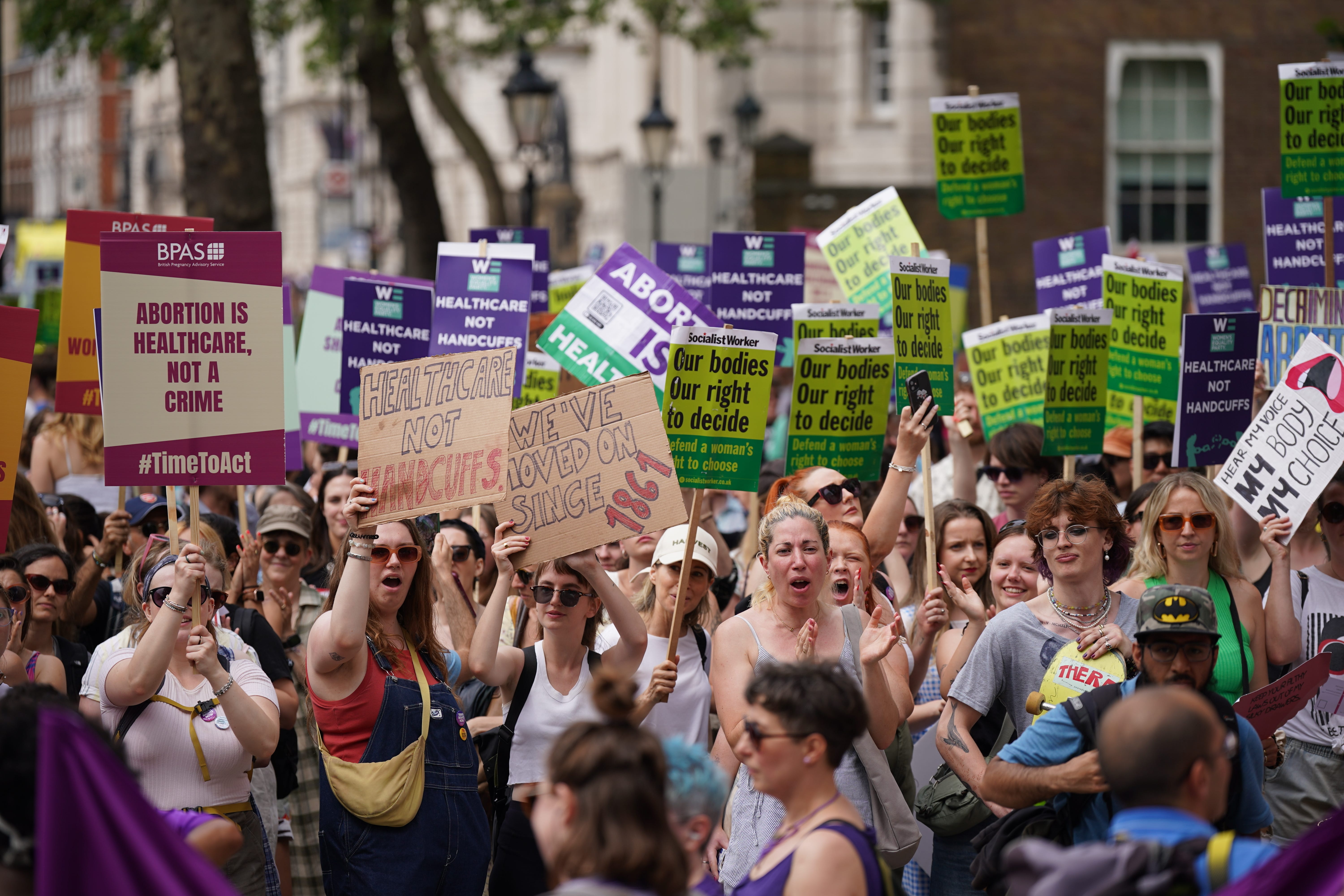Protesters demand an end to the criminalisation of abortion
Carla Foster, 44, was given a 28-month extended sentence earlier this week after she admitted illegally procuring her own abortion.

Thousands of protesters descended on London and chanted “Free Carla Foster” as they demanded an end to the criminalisation of abortion.
Foster, 44, was given a 28-month extended sentence earlier this week after she admitted illegally procuring her own abortion when she was between 32 and 34 weeks.
The protesters marched from the Royal Courts of Justice to Whitehall on Saturday, holding signs saying “abortion is healthcare” and “policing our bodies is the real crime”.
They also chanted “one, two, three, safe, legal, free”, and “what do we do when abortion rights are under attack? Stand up fight back”.
Labour MP Stella Creasy gave a speech to the protesters.
“This week proves what some of us have been trying to tell, often at length, patiently, to middle-aged men on Twitter,” she said.
“We do not have a legal right to choose in England and Wales, and that has very real consequences.
“There have been 67 legal prosecutions of women in the past 10 years under the offences against the person act of 1861.”
She said that the legislation was no longer “fit for purpose”.
“It is a piece of legislation, especially sections 58 and 59, that are no longer fit for purpose,” she said.
“And I stand here today asking what your red line is, because absolutely these cases are difficult, nobody doubts that, but what we’re asking for is a starting point of compassion.
“Because we now find a mum of three children, one of whom has special education needs, in prison.
“Whose interests does that serve, to keep punishing this woman?”
Lucy Wing, 21, from Walthamstow, London, said she was “outraged”.
“I am here because I do not believe that the law that Carla Foster was sentenced under was at all just,” she said.
“A legal understanding of what a person is does not encompass a foetus and it does not encompass a child that was born not breathing.
“That child does not have any human rights because it is not seen as a person.
“So how can an offence be committed against it? It makes no sense, I don’t think it’s an appropriate law at all and I’m outraged.”
East London based obstetrician and gynaecologist Ed Dorman, 64, said that Foster’s case had “galvanised” the abortion movement.
He added: “I think it has galvanised, as you can tell from today, a lot of very strong feeling about the inappropriateness of the way the law, if it’s applied, can result in somebody being sent to prison for ending their own pregnancy.
“Despite the judge saying that she is a good mother, that he has taken her away from her children and imposed a custodial sentence which serves no purpose.”
He said he would like to see abortion care being taken out of criminal law.
“I would like to see, as in Northern Ireland, the whole remit of abortion care being taken out of the criminal law and, whilst still regulated, be like any other part of healthcare,” he said.
The 162-year-old law banning abortion was amended in 1967, legalising abortion with an authorised provider up to 28 weeks, which was later lowered to 24 weeks in 1991.
There are very limited circumstances that would allow an abortion after 24 weeks, such as if the mother’s life is at risk or if the child would be born with a severe disability.
During the Covid-19 lockdown, at-home abortion pills were made available by post for people seeking an abortion in the first 10 weeks of pregnancy, whereas before they would have had to attend a clinic in person, and the measure was made permanent in August 2020.
Foster, who was sentenced at Stoke-on-Trent Crown Court on Monday, requested the abortion pills during lockdown but prosecutors said she lied to the British Pregnancy Advisory Service (BPAS) about how far along in her pregnancy she was.
The court also heard Foster made a number of internet searches between February and May 2020, including “how to hide a pregnancy bump”, “how to have an abortion without going to the doctor” and “how to lose a baby at six months”.
Bookmark popover
Removed from bookmarks